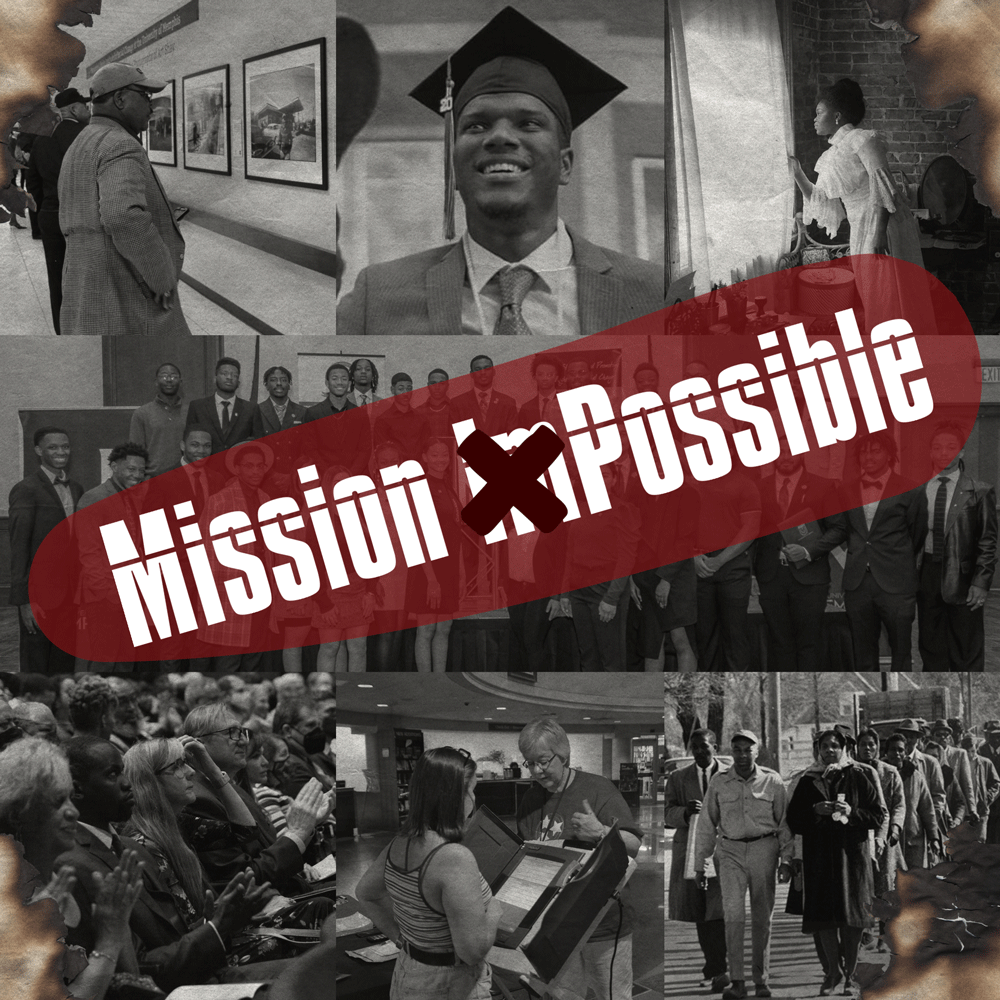2025 Events
Upcoming Events
April 23
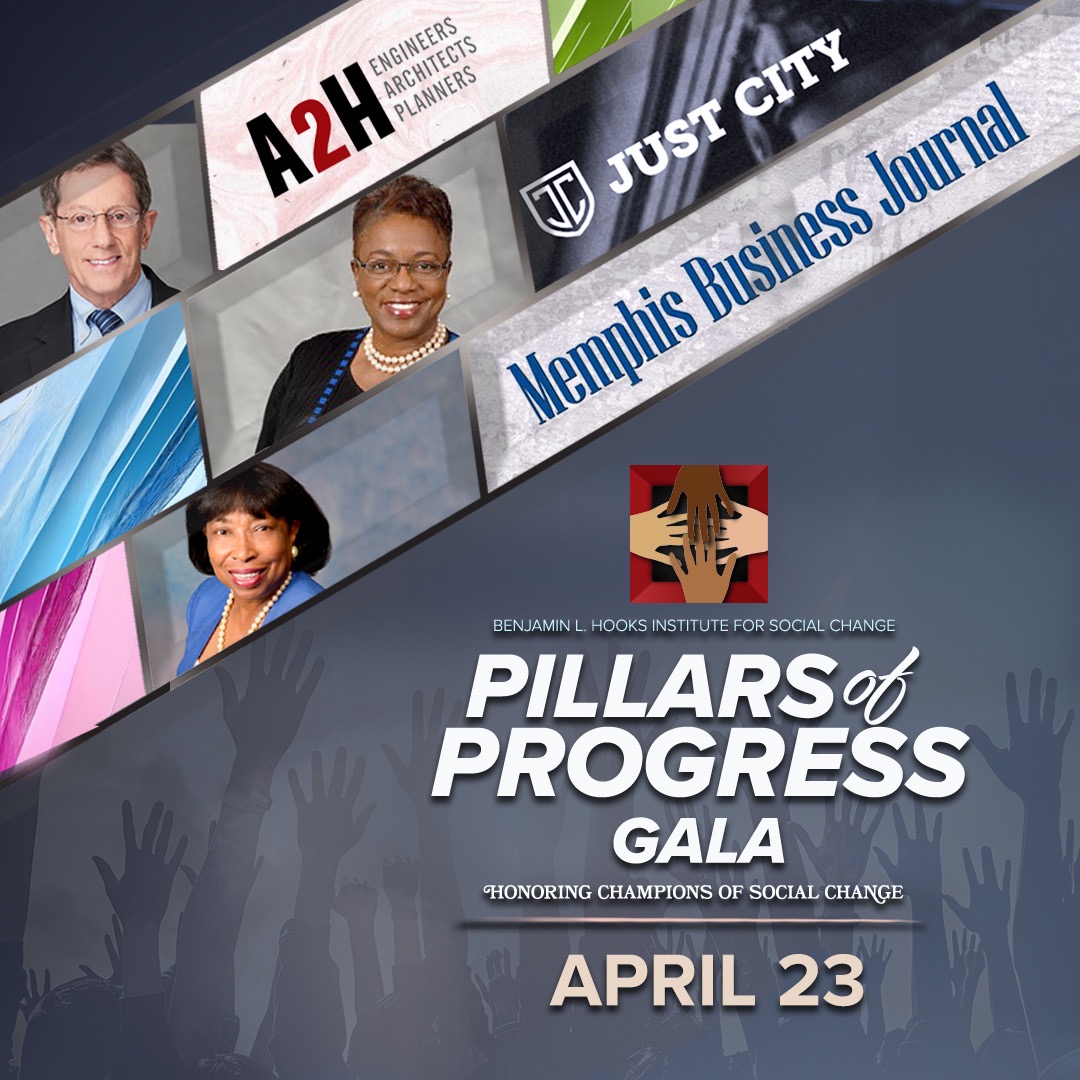 Hooks Institute Pillars of Progress Gala
Hooks Institute Pillars of Progress Gala
On Wednesday, April 23, 2025 the Benjamin L. Hooks Institute for Social Change at the University of Memphis will honor organizations and individuals who have made significant contributions to advancing equity, inclusion and social justice. They include A2H Engineers Architects Planners, Just City and the Memphis Business Journal along with the Honorable Bernice B. Donald, Dorothy Cleaves and Dr. Andy Meyers. Learn more about these "Pillars of Progress" here.
The Hooks Institute proudly recognizes these honorees for their impactful contributions to the community in their respective fields. Their dedication to the greater Memphis communities has helped create a stronger, more vibrant Memphis by uplifting those who remain at the margins of society.
Proceeds from the event will support the Hooks Institute’s vital programs, including community engagement, faculty research, student success initiatives and the preservation of civil rights history.
Quick View Event Details:
Pillars of Progress Awards Gala
Maxine A. Smith University Center Ballroom
University of Memphis Central Campus
Wednesday, April 23, 6 PM – 8 PM, doors open at 5:30 PM
Individual tickets for the event are $125, and a full table of eight can be purchased for $1,200 through Eventbrite. Tickets include dinner, live music and the awards presentation.
Parking Info:
Parking is available in the Zach Curlin Garage.
505 Zach H. Curlin Street
Memphis, TN 38152-3500
More information and tickets available at HooksGala.eventbrite.com
Sponsored by the Following Entities:
Nike | Premiere Sponsor
Cigna, The Memphis Grizzlies, Pinnacle Financial Partners, Regional One Healthcare, and Friends of Just City | Supporting Sponsors
The Host Committee for the Pillars of Progress Awards Gala includes:
Audrey Davis, Jesse J. Turner, Steve Swain (Hooks Board Members) Daniel and Meggan Kiel (Friends of the Hooks Institute), Willie Gregory (Nike), JW Gibson (Gibson Companies) and the Hooks Institute staff.
The Hooks Institute deeply appreciates the support from the following departments and faculty at the University of Memphis:
College of Arts and Sciences
Division of Research & Innovation
Faculty Friends of the Hooks Institute
Herff College of Engineering
Office of Governmental & Community Affairs
School of Urban Affairs and Public Policy
Past Events
March 3
Reception with author and civil rights movement veteran Charles Cobb, Jr.
Meet Charles Cobb Jr., journalist, author of "“This Non-Violent Stuff’ll Get You Killed," and veteran of civil rights movement org., SNCC.
February 19
Black Inclusion Guild (First Horizon Bank), “Labor Leadership, and Legacy Panel."
Panelists, Daphene R. McFerren, Hooks Institute Executive Director., Ernest Strickland, CEO, Black Business Association and Vernon Stafford, Chief Audit Executive of financial services, panelists.
February 13
West TN PBS -"Tennessee is Talking."
Daphene R. McFerren, Hooks Institute Executive Director, provides a historical overview of the Fayette County, TN Civil Rights Movement that began in 1959 when African Americans demanded the right to vote.
February 12
IBM Tech Talk - "AI and Bias in the System"
Amy Ruggaber, Hooks Institute Assistant Director, spoke to students from institutions of higher learning around the world in IBM's monthly Tech Talk on the importance of recognizing and working to correct information gaps and the resulting inherent bias in the Large Language Models used to train generative AI.
February 5
Hooks National Book Award Presentation and Lecture - "Our Secret Society" Featuring Dr. Tanisha C. Ford, Author

The Benjamin L. Hooks Institute for Social Change at the University of Memphis will present the Hooks National Book Award to Dr. Tanisha C. Ford, author of Our Secret Society: Mollie Moon and the Glamour, Money, and Power Behind the Civil Rights Movement on Wednesday, February 5 at 6:00 PM. The event, in partnership with the University of Memphis’ Graduate Association for African-American History (GAAAH), will include the award presentation and a lecture by Dr. Ford. There will be a reception, with light hors d’oeuvres, reminiscent of Mollie Moon’s soirees, at 5:30 PM .
Quick View Event Details:
Hooks National Book Award Presentation and Lecture
The Michael D. Rose Theatre, University of Memphis Central Campus
Wednesday, February 5, 5:30 PM – 7:30PM
Sponsored by the Following University of Memphis Entities:
African and African American Studies Program
English Department
History Department
Marcus W. Orr Center for the Humanities
January 30
Centennial Celebration: Commemorate the 100th Birthday of Benjamin L. Hooks
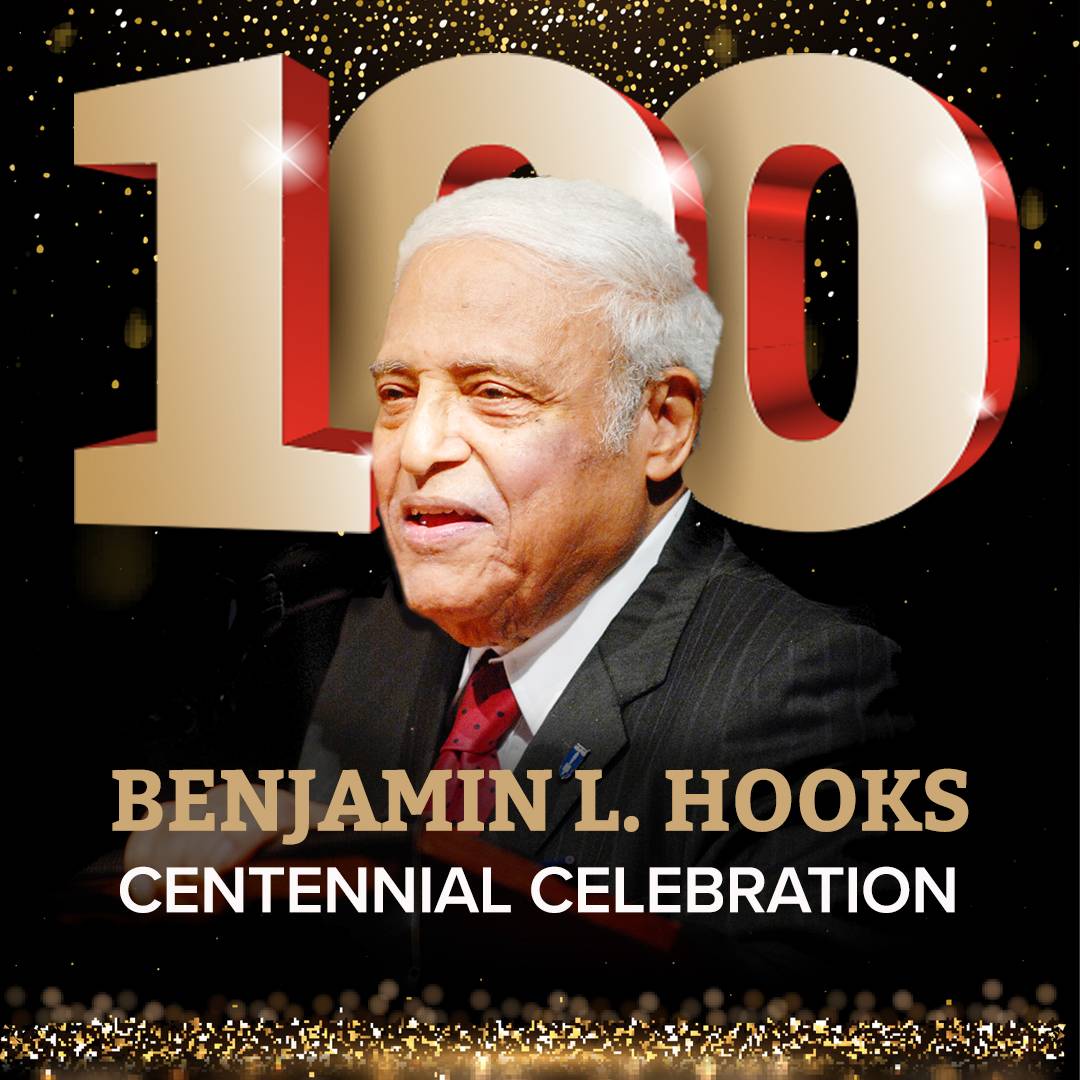
The Benjamin L. Hooks Institute for Social Change at the University of Memphis will celebrate what would have been Hooks’ 100th birthday with a reception and screening of the Hooks Institute’s film “Duty of the Hour”, a documentary about the life of Benjamin Hooks on Thursday, January 30, 2025. This special evening will give the community in Hooks’ hometown an opportunity to recognize the life and impact of a great Memphian and American.
Quick View Event Details:
Centennial Celebration: Commemorate the 100th Birthday of Benjamin L. Hooks.
The University Theatre in the Maxine A. Smith University Center, University of Memphis
Central Campus
Thursday, January 30th 5:30 PM – 8 PM
Hosted by the Benjamin L. Hooks Institute for Social Change at the University of Memphis
in partnership with the Epsilon Phi Chapter of Omega Psi Phi Fraternity, Inc.
2024 Events
Past Events
October 17
Community Reinvestment Act Luncheon Hosted by Pinnacle Financial Partners at Hooks Institute
Area banks and financial institutions participating in Community Reinvestment Act programming attended a luncheon at the Benjamin L. Hooks Institute for Social Change on the 11th floor of Wilder Tower on the UofM Central Campus. Hosted by Pinnacle Financial Partners, this event provided these financial institutions with an opportunity to learn about Hooks Institute programming and its mission of teaching, studying and promoting civil rights and social change.
October 10 - 29
The Frances Dancy Hooks Social Change Art Award and Exhibition
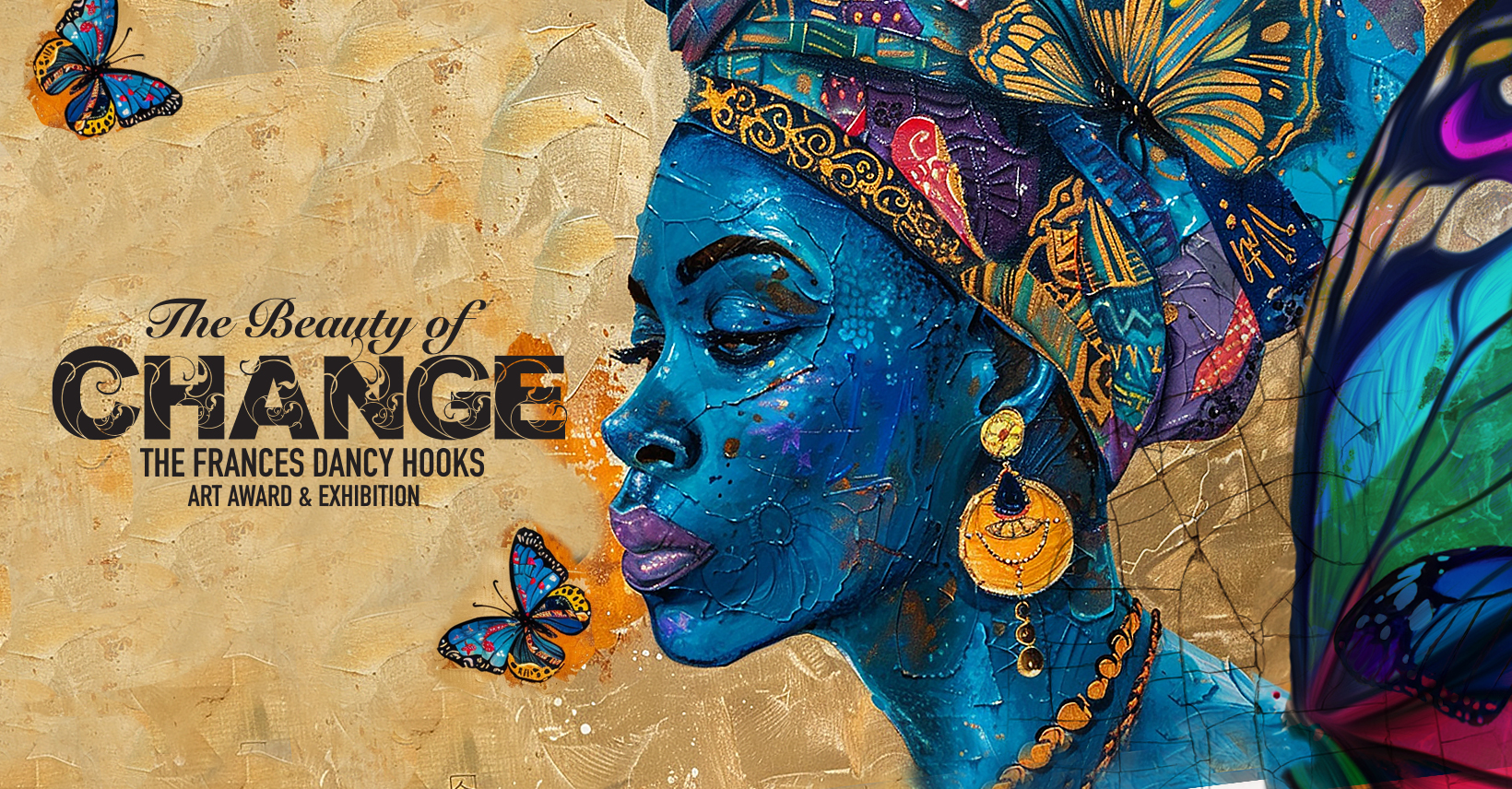
The Theme: The Beauty of Change
Change can be difficult, but it can also be beautiful.
The Benjamin L. Hooks Institute for Social Change invites you to experience art exploring this idea. This exhibit features the works of Memphis-based artists who are finalists for the Frances Dancy Hooks Art Award.
Featured artists include: Gabrielle Yasmeen, Myia Michelle, Lunarely, Michelle Le, Jessi Ujazi, Allyssa Martin, Carrie Veil, Bryant Walker, D.Weaver, and Sarah Wright.
The exhibit was held in the Dr. Ralph Faudree Exhibit Space in the Benjamin L. Hooks Institute for Social Change on the 11th floor of Wilder Tower.
The Benjamin L. Hooks Institute for Social Change extends its sincere gratitude to the following members of the volunteer selection committee: Lurlynn Franklin, Artist and Educator; Lakiesha Edwards, Executive Director, Urban Art Commission; and Dr. Richard Lou, Artist and Faculty, University of Memphis Department of Art and Design.
Contact amy.ruggaber@memphis.edu with questions.
Aug. 16 - Nov. 8
'Uplift the Vote' Exhibit on Displayed in the McWherter Library on UofM Central Campus
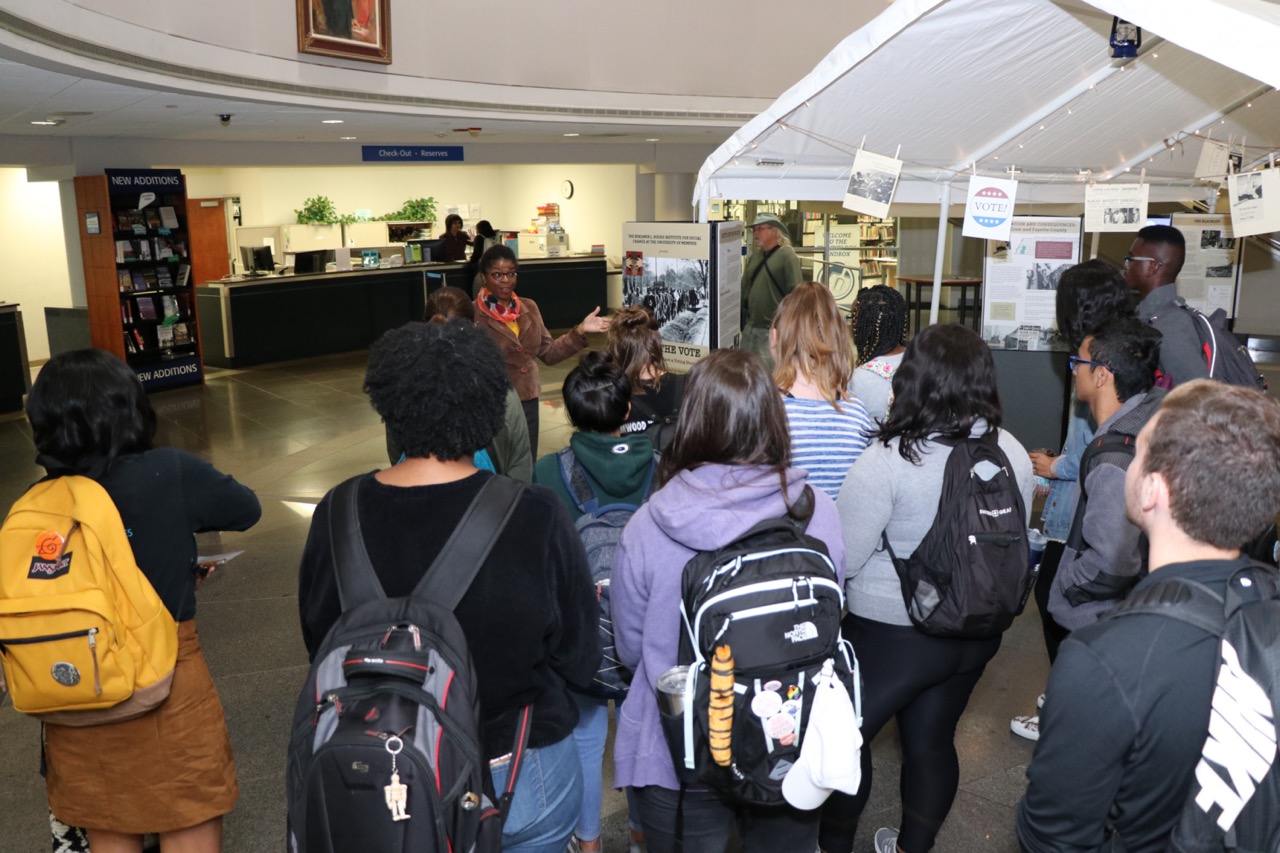
The Benjamin L. Hooks Institute for Social Change at the University of Memphis invited
the public to experience the return of its acclaimed exhibit, "Uplift the Vote," which
returned to its original location in the rotunda of the Ned McWherter Library on the
Central Campus of the University. This dual exhibit has toured extensively in Western
TN and is focused on both the historical and contemporary importance of our most basic
civil right: the right to vote.
Historical context on the urgency and importance of voting is given through an exploration of the Fayette County “Tent City” Civil Rights Movement of the late 1950s and 1960s. Using photographs, documents and reflections primarily collected by the activists and their families, visitors learn how Fayette County African Americans' demand for the right to vote changed their lives, the community and ultimately, the nation.
Visitors can also learn information about current Tennessee voter registration laws, and non-partisan best practices on how to research candidates, issues and prepare to cast one’s ballot in an election.
The exhibit was displayed in the rotunda of the Ned McWherter Library on the UofM campus from Friday, Aug. 16 through Friday, Nov. 8.
About the "Uplift the Vote" Exhibit
Fayette County, Tenn., 1959: The African American community faces Jim Crow laws, intimidation and violence in their efforts to register to vote. The New York Times described the movement in Fayette County as "the longest sustained civil rights protest in the nation." During that movement, African Americans worked to increase registered voters and demanded fair elections, integration of public facilities and equal access to economic opportunities.
First designed for display on the University of Memphis campus in 2018, the “Uplift the Vote” exhibit has become a popular touring exhibition for the Hooks Institute, traveling to Fayette and Haywood counties to educate students and community members about their own grassroots Civil Rights Movement. Additionally, it has inspired a second exhibit, now on display at the Memphis International Airport, which focuses on powerful images of the movement captured by LIFE Magazine photographer Art Shay. Lauded as an excellent example of historical context spurring contemporary action, many UofM students have registered to vote standing right beside the installation.
The Benjamin L. Hooks Institute for Social Change extends its sincere gratitude to the following sponsors of this exhibit: OMO Energy & Technology, Inc.; the UofM's African and African American History program, Cecil C. Humphreys School of Law, Department of History, Department of Political Science, Student Government Association, Department of Theatre & Dance and University of Memphis Libraries.
APRIL 11
Brown v. Board of Education: 70 Years Later, Where Will Memphis and the Nation Go Next?
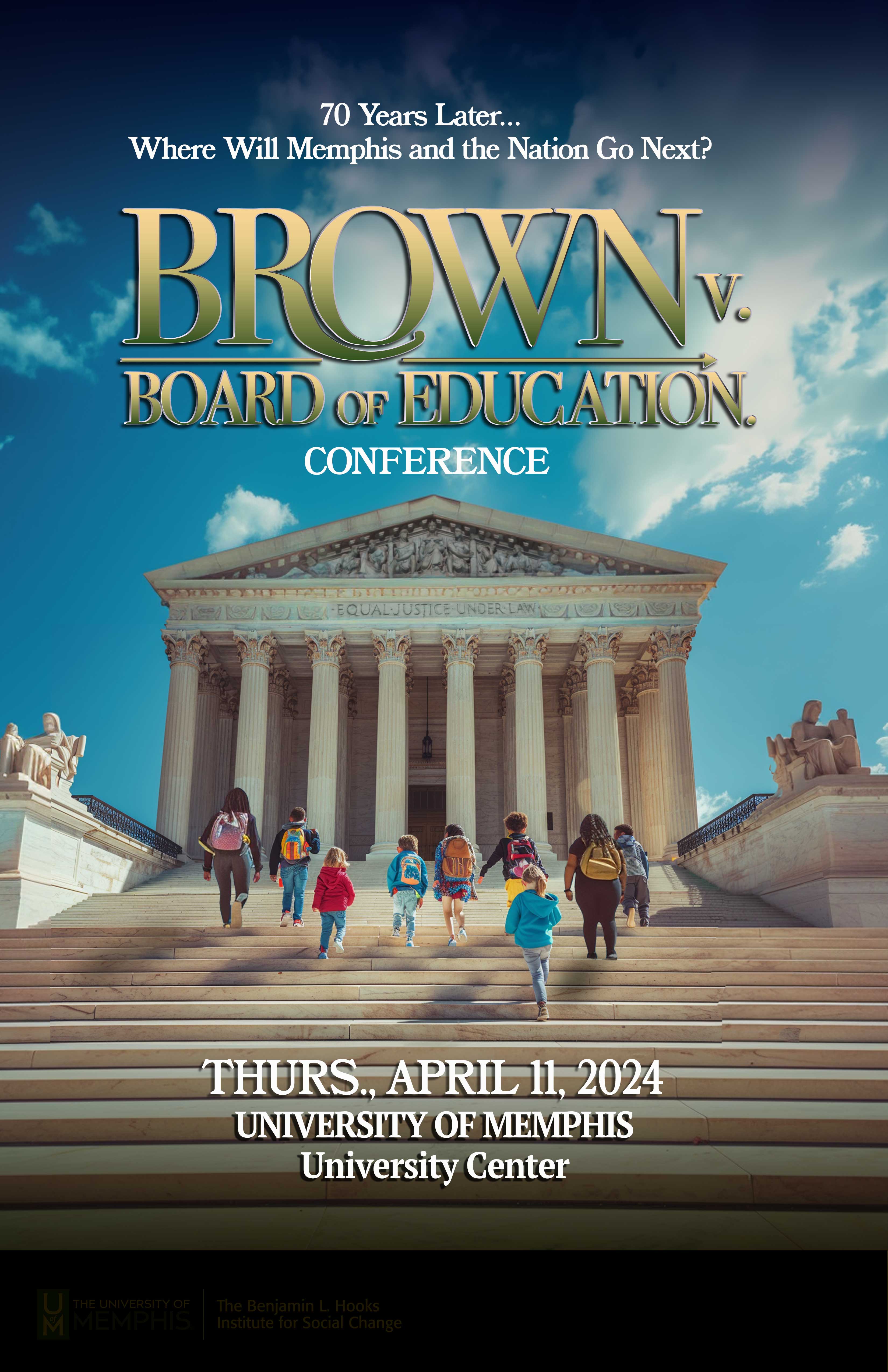
On April 11, 2024, the Benjamin L. Hooks Institute for Social Change hosted a conference to examine the legacy of the Brown v. Board of Education (1954). In one of the most important decisions in the nation’s history, the U.S. Supreme Court held that the separate but equal doctrine that had been the law of the land violated the Equal Protection Clause of the 14th Amendment of the U.S. Constitution by relegating African American children to second-class citizenship by forcing them to attend segregated schools.
While this decision had a profound impact on helping to eradicate discrimination in all spheres of American life, this conference will examine the impact of the Brown decision on creating equity in education for marginalized groups in Memphis and America Today.
The conference was held Thurs. April 11, 2024, starting at 10 am in the University Center on the University of Memphis campus. The Hon. Catherine Lhamon, Assistant Secretary for Civil Rights, U.S. Department of Education delivered the plenary address and Tona Boyd, Associate Director-Counsel of the Legal Defense Fund of the NAACP (New York) delivered the keynote address.
A panel of professionals in education, law, and policy discussed the current state of the quest for racial justice and educational equity. Additionally, a special panel of youth representatives and future professionals gave voice to contemporary experiences of diversity in schooling, racial and educational justice.
This conference was designed to appeal to the legal and education community as well as policymakers and students.
CLICK HERE FOR CONFERENCE PAGE
February 27
Hooks National Book Award Presentation and Guest Lecture

Hattiloo Theatre
37 S Cooper Street, Memphis, TN 38104
Thursday, February 27, 2024 | 6pm
April 18
2023 Hooks Institute Donor Appreciation Reception
Maxine A. Smith University Center, University of Memphis
499 University Street, Memphis, TN 38152.
April 18, 2023 | 6 pm
A reception was hosted by the Hooks advisory board and staff and University of Memphis students enrolled in Hooks Institute programs for academic, personal, and professional success. Guests enjoyed food, music and entertaining presentations on how the work of the Hooks Institute impacts the lives of those seeking to realize their own potential and that of their communities.
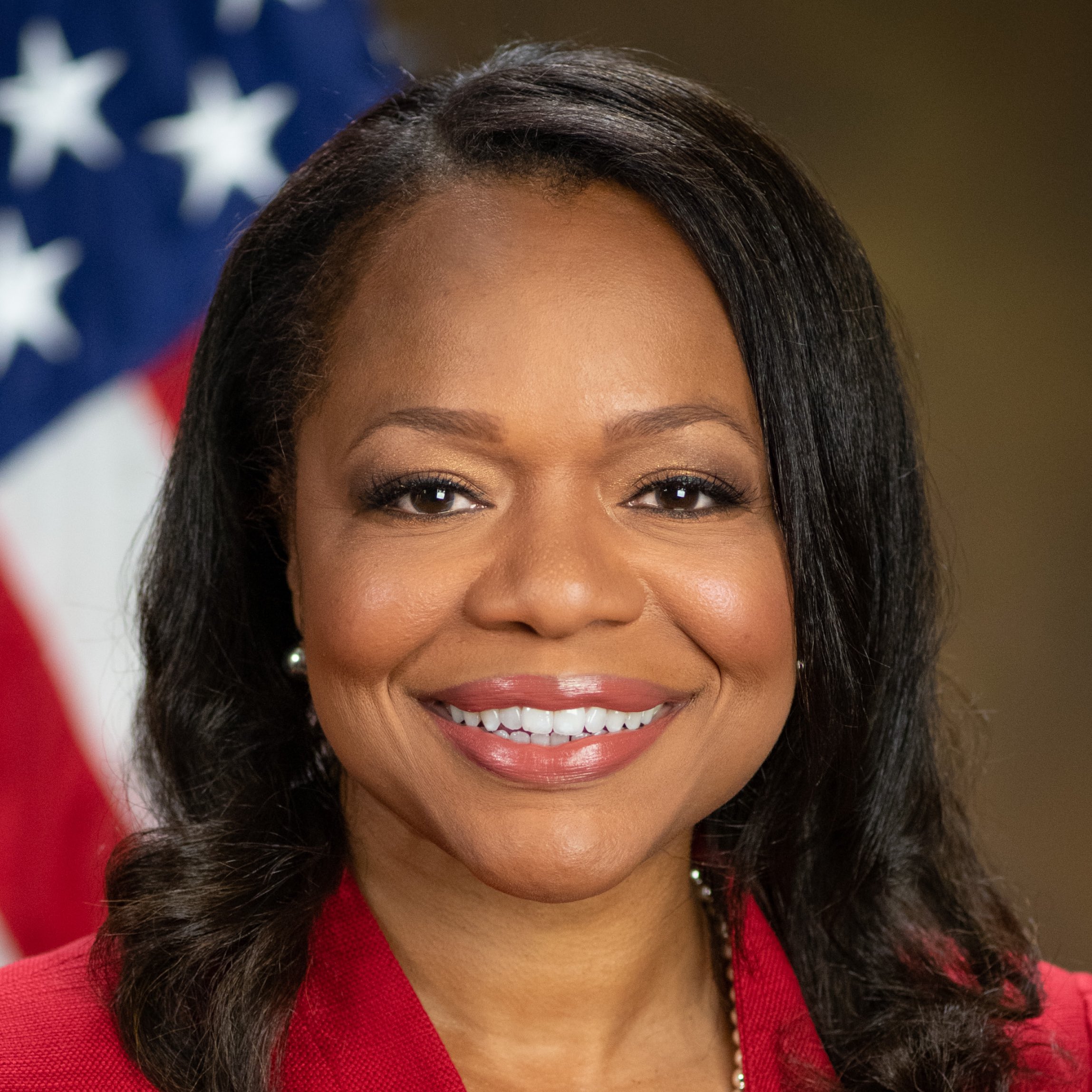 April 3
April 3
Community Conversation with Assistant Attorney General for Civil Rights Kristen Clarke from the U.S. Department of Justice
University of Memphis, Maxine A. Smith University Center, University Center Theater
499 University Street, Memphis, TN 38152.
The Benjamin L. Hooks Institute for Social Change at the University of Memphis hosted a community conversation on April 3 at 6 PM with Assistant Attorney General for Civil Rights Kristen Clarke from the U.S. Department of Justice at the University Center Theatre at the University of Memphis. Clarke's work includes upholding civil and constitutional rights for all Americans, addressing hate crimes, voting rights, police department policies, and discrimination in employment and LGBTQIA+ rights.
February 28
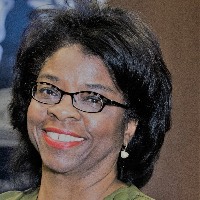 Daphene McFerren, Keynote Address to the U.S. Department of Health and Human Services
Daphene McFerren, Keynote Address to the U.S. Department of Health and Human Services
Hooks Institute Executive Director R. Daphene McFerren provided virtual keynote addresses to attorneys at the U.S. Department of Health and Human Services, Office of Inspector General (Washington, D.C.).
February 25
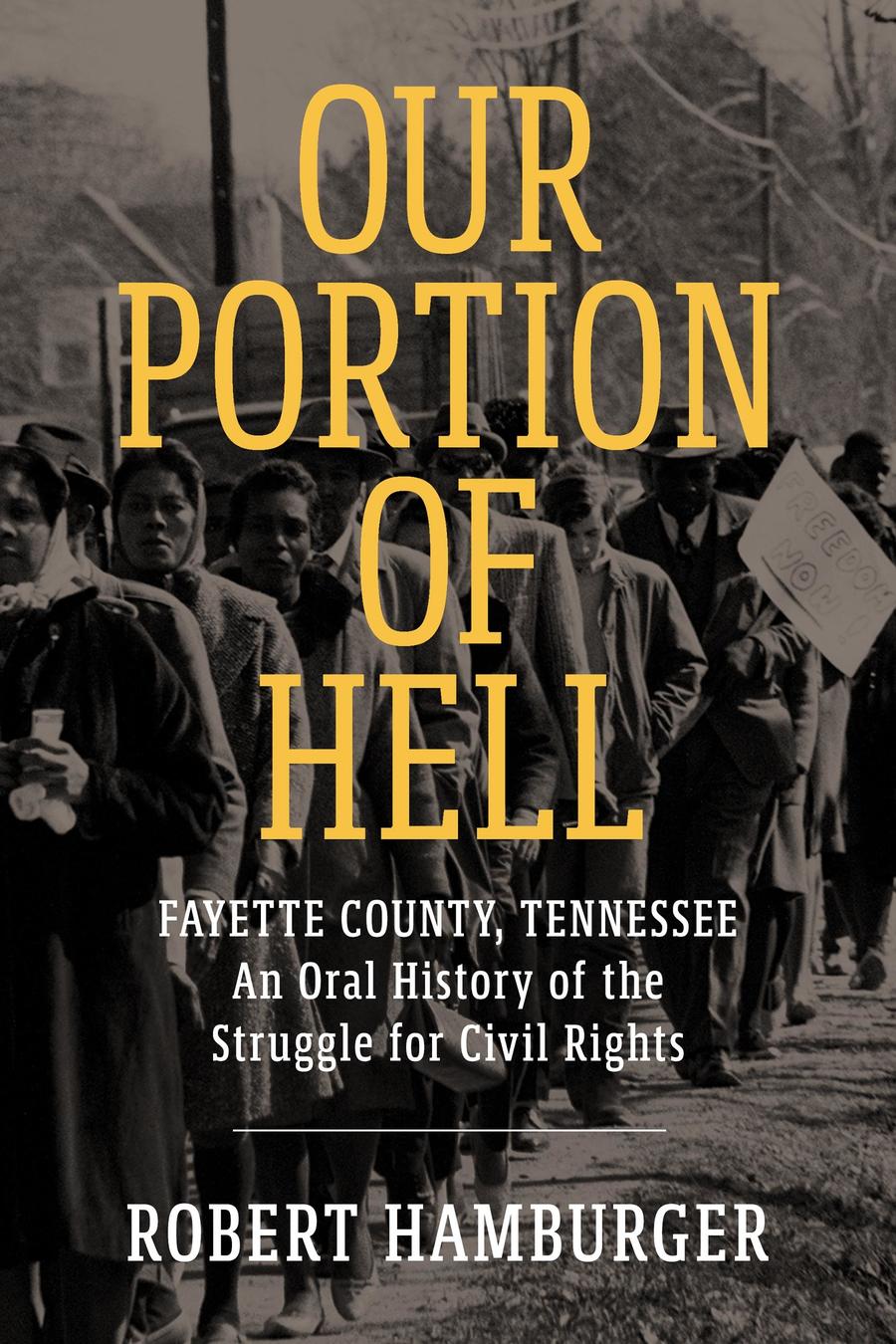 Book Signing with Robert Hamburger, Author of Our Portion of Hell: Fayette County, Tennessee: An Oral History of the Struggle for
Civil Rights
Book Signing with Robert Hamburger, Author of Our Portion of Hell: Fayette County, Tennessee: An Oral History of the Struggle for
Civil Rights
Location & Time
Sat., Feb. 25, 2 PM
Fayette County Public Schools Central Administration Building 10425 Hwy 76 S. Somerville,
TN, 38068
About the Event
Book Signing with Robert Hamburger and Presentations from Robert Hamburger and Daphene McFerren, Hooks Institute executive director and daughter of Fayette County Civil Rights Activists John and Viola McFerren, will speak at the event.
Activists from the Fayette County Civil Rights Movement will also attend.
About Our Portion of Hell: Fayette County, Tennessee: An Oral History of the Struggle for Civil Rights
Recently released by the University of Mississippi Press for its second edition, Our Portion of Hell: Fayette County, Tennessee: An Oral History of the Struggle for Civil Rights offers an unrivalled account of how the rural Black community of Fayette County, Tennessee drew together to combat the immense forces aligned against them in the late 1950s-1970s. Author Robert Hamburger first visited Fayette County as part of a student civil rights project in 1965 and, in 1971, set out to document the history of the grassroots movement there.
Visit the event page through the button below for more information!
February 23
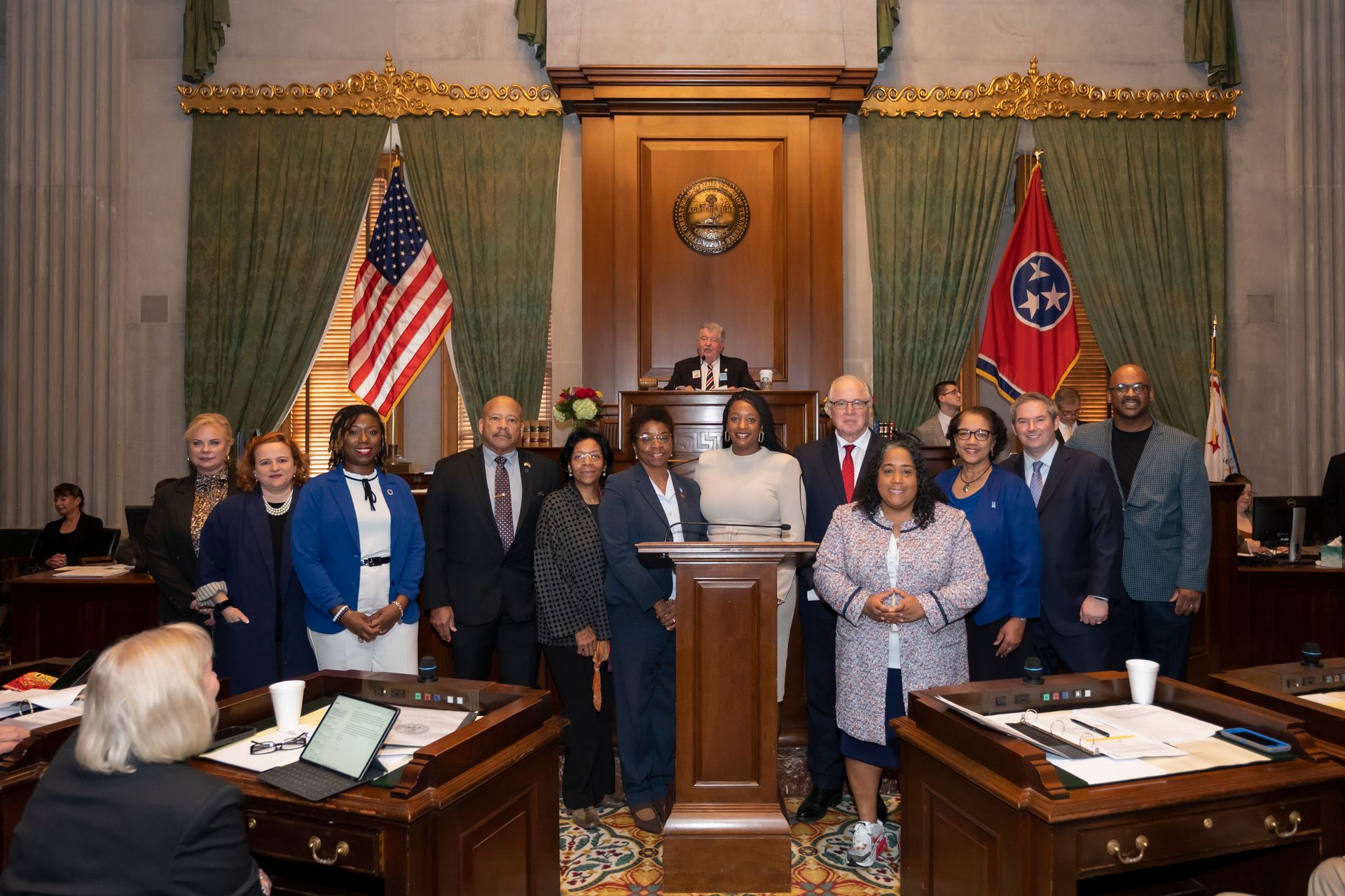 Tennessee General Assembly Honors Fayette County Activists and the University of Memphis
Hooks Institute with Resolution
Tennessee General Assembly Honors Fayette County Activists and the University of Memphis
Hooks Institute with Resolution
The Tennessee General Assembly recently passed a resolution to honor the activists from the Fayette County Movement and the documentary, website and exhibitions created by the University of Memphis Hooks Institute to preserve and analyze the history of this movement.
Senator Lamar London (Dist. 33, Shelby Co.) and Senator Page Walley (Dist. 26, includes Fayette Co.) sponsored the resolution. Before the General Assembly voted on the Resolution, Hooks Institute Executive Director Daphene R. McFerren made brief remarks on the critical importance of preserving this historical work to help ensure equity and social justice for future generations. Her remarks received a standing ovation from the General Assembly.
The Hooks Institute extends its sincere gratitude to Senators Lamar and Walley for introducing the resolution, and to the Tennessee General Assembly for passing the resolution without opposition.
The text of the resolution can be read here: capitol.tn.gov/Bills/113/Bill/SR0033.pdf.
February 21
 Daphene McFerren Keynote Address at the U.S. Department of Justice
Daphene McFerren Keynote Address at the U.S. Department of Justice
Hooks Institute Executive Director R. Daphene McFerren provided virtual keynote addresses to attorneys and staff from the U.S. Department of Justice (Washington, D.C. and regional offices) on how the history of the nation and Memphis continues to shape contemporary racial, economic and other disparities of today.
February 4
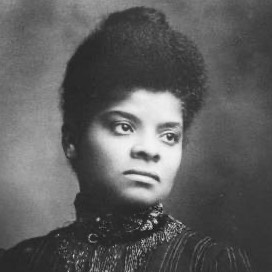 Screening of "Facing Down Storms: Memphis and the Making of Ida B. Wells" at the Literature
is Liberating Festival, Crosstown Concourse
Screening of "Facing Down Storms: Memphis and the Making of Ida B. Wells" at the Literature
is Liberating Festival, Crosstown Concourse
Sat. Feb. 4 | 1:30 pm, Crosstown Concourse Theater
A screening of the Hooks Institute's documentary film on Ida B. Wells, "Facing Down Storms: Memphis and the Making of Ida B. Wells" at Crosstown as part of the Crosstown Arts Liturature is Liberating Festival. Daphene McFerren spoke on the legacy of Ida B. Wells and the making of the documentary.
February 3
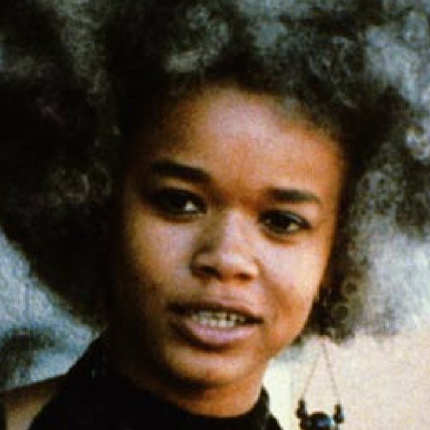 Screening of Hooks Documentaries at Trezevant Manor
Screening of Hooks Documentaries at Trezevant Manor
Fri. Feb. 3 | Trezevant Manor, Memphis
Screening of Hooks Institute Documentaries "The Civil Rights Movement: A Cultural Revolution" and " Reflections of Maxine Smith | Martin Luther King Jr's College Years and Assassination" as part of Trezevant Manor's African American History Month celebrations"

